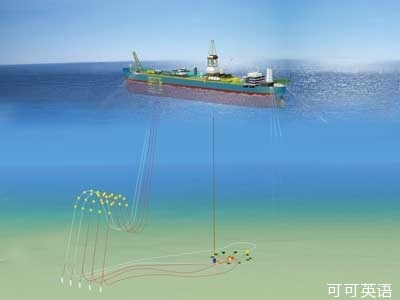(单词翻译:单击)
That's the sound of air gun testing for the presence of oil and gas under the seabed. “Air gun” is a euphemism for a massive release of compressed air. Don't like it? Neither does underwater life.
这是检测海底是否有石油或天然气存在时的气枪发出的声响。“气枪”是压缩气体大规模释放的委婉表达。不喜欢它吗?海底的生命也不喜欢。
Such testing also isn't a one-off burst of 250-decibel sound louder than a jet engine. For days or even weeks at a time, these guns send a volley of ear-shattering sound through the ocean to impact the seafloor every ten seconds or so. That's nearly 9,000 such bursts per day.

这样的爆炸分贝高达250,比喷气发动机更响,而且不是一次性的爆炸。这些气枪每十秒钟便发出震耳欲聋的声响,穿过海洋到达海底,这样持续数天或数周。这样的爆炸每天会重复近9000次。
Our mammal cousins, whales and dolphins particularly loathe air guns. Perhaps that's because hundreds of thousands of the animals can be injured by them each year.
我们的哺乳动物近亲——白鲸和海豚尤其讨厌这种气枪。也许是因为每年都有成百上千的哺乳动物因此受伤吧。
As you can imagine, in addition to injuring whales and dolphins through hearing loss, it also puts them off their food and has even been linked to strandings. And it's not just sea mammals. Turtles, fish and other marine creatures are similarly affected as the sound travels for thousands of kilometers.
正如你所想象的,除了使白鲸和海豚的听力受损外,气枪还会阻碍他们捕食,甚至造成搁浅。在声波传递数千公里的同时,不光是海生哺乳动物,乌龟、鱼以及其它海洋生物也会受到同样的影响。
And this is all before any drilling takes place. If fossil fuel exploration is opened up along the U.S. east coast, an already noisy neighborhood from ship traffic will get a lot louder.
而且这只是开始,接下来还有海底钻探。如果开发美国东部海岸进行石油开采,那么受来往船只清扰的海洋社区会变得日益聒噪。
原文译文属可可原创,未经允许请勿转载!


